Duterte’s promises and his first year in office: Law and order
Rodrigo Duterte centered his presidential campaign on the eradication of crime and the illegal drug trade. He had made his name as the tough-talking southern mayor who, many of his constituents said, walked the walk and cleaned up Davao City.
During the presidential campaign, Duterte on more than one occasion stated that he would only need three to six months to greatly improve the peace and order situation in the country, if not eradicate crime and the drug trade entirely.
Below are some of the promises Duterte made on issues of peace and order and law enforcement.
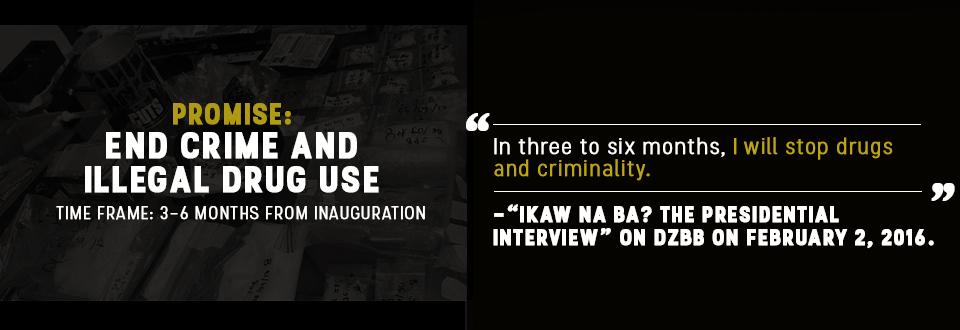
Three months into his presidency, Duterte backpedaled on his campaign promise by asking for six months more for his war on drugs, telling reporters last September that he did not realize how severe the drug problem was until he was elected President.
He added that the war on drugs had exposed so many people involved in the business of illegal drugs, it was like pressing “worms out of a can.”
In January, Duterte announced that the fight against illegal drugs would continue until the last day of his term in 2022.
Local and international human rights groups and Western governments have voiced their alarm over the Duterte administration's heavy-handed approach to the drug problem, as the death toll in the "war on drugs" continued to rise.
According to government data, 3,151 drug suspects have been killed and 1,306,389 individuals have surrendered since the nationwide anti-narcotics crackdown began on July 1, 2016. The data was last updated on June 13, 2017.
Despite the mounting deaths, the Duterte administration denied there was a "sudden wave" of state-sponsored extrajudicial killings in the Philippines, which the United Nations is planning to look into.
The PNP also announced a 10-percent reduction in crimes committed during the first 11 months of Duterte's administration: 521,440 from July 2016 to May 2017, compared to 580,332 from July 2015 to May 2016.
Appearing before the United Nations Human Rights Council in Geneva last May, Foreign Affairs Secretary Alan Peter Cayetano said that the campaign against illegal drugs is pursued to "preserve the lives of the Filipino people and prevent the country from turning into a narco-state."
"At all times, the Duterte administration seeks to uphold the rule of law. In fact, President Duterte has a policy of zero tolerance for abuse by law enforcers," Cayetano said.
Cayetano headed the 16-man Philippine delegation for UNHRC's Universal Periodic Review (UPR).
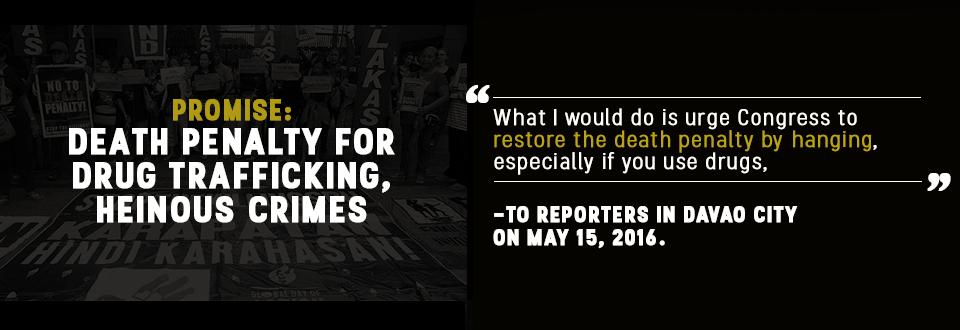
Taking their cue from the President, lawmakers led by House Speaker Pantaleon Alvarez introduced bills advocating the revival of the death penalty, which was abolished during the presidency of Gloria Macapagal-Arroyo in 2006.
After months of deliberations, the House of Representatives on March 7, 2017 passed on third and final reading House Bill No. 4727, which seeks to bring back capital punishment for seven drug-related offenses.
Earlier versions included rape and plunder among the crimes punishable by death; these were later removed to garner more support from lawmakers.
Malacañang is hopeful that the death penalty bill will be passed in the Senate, where a number of senators have already expressed opposition.
"The restoration of capital punishment underlines the Duterte administration’s goal to reduce illegal drug-related criminality," Presidential Spokesperson Ernesto Abella said after the House approved the measure.
"The death penalty, with its strong deterrent effects, protects innocent lives. At the same time, its punitive aspect ensures that criminals recompense grievous loss."
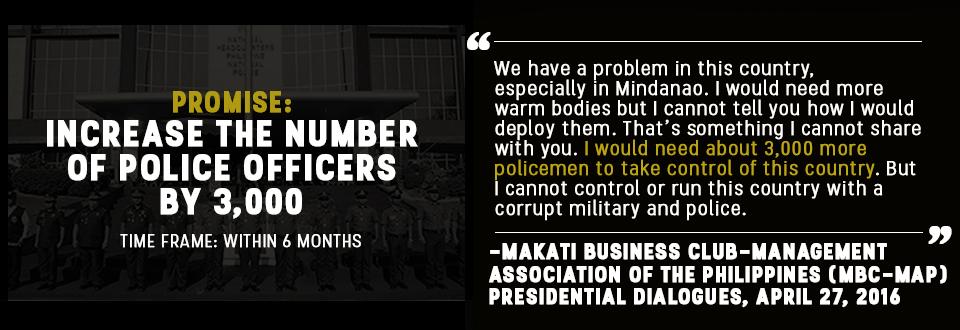
As of June 21, PNP chief Director General Ronald dela Rosa approved the recruitment of 14,484 additional personnel. Ten thousand were allocated to the regular recruitment program while 4,484 was given to the attrition recruitment program.
Meanwhile, the PNP projects that it will achieve what it says is the "ideal ratio" of one policeman for every 500 residents by 2022.
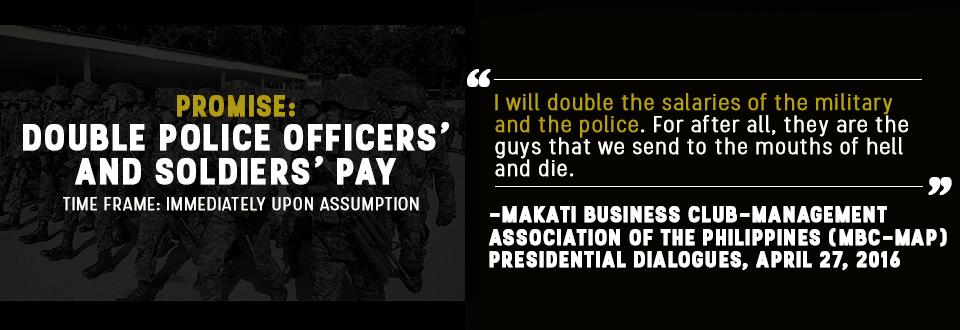
On the campaign trail in April 2016, President Rodrigo Duterte promised a pay hike for both policemen and the military that would be effective upon assumption of office.
However, this did not materialize. In July 2016, he stated that an incremental increase will begin in August. It was moved again as he promised anew that uniformed personnel will receive the increase by December 2016.
About P39.59 billion of the proposed 2017 national budget has been earmarked by the government for the salary increase of soldiers, policemen, and other uniformed personnel, according to Budget Secretary Benjamin Diokno.
In October 2016, Duterte signed Executive Order No. 3 increasing the combat duty pay and combat incentive pay of the Armed Forces of the Philippines (AFP) and the Philippine National Police (PNP) to a fixed rate of P3,000 per month from the previous P500 per month for the AFP and P340 per month for the PNP.
Uniformed personnel started to receive their pay hike on January 1, as part of the second tranche of the government's salary standardization. Diokno said that the salary adjustment was a follow-through of former President Aquino's executive order on a pay hike for government workers.
Diokno said that Duterte's promise to double soldiers' and police officers' salary can be achieved by January 2018. "Sooner, if we pass the tax reform," he said.
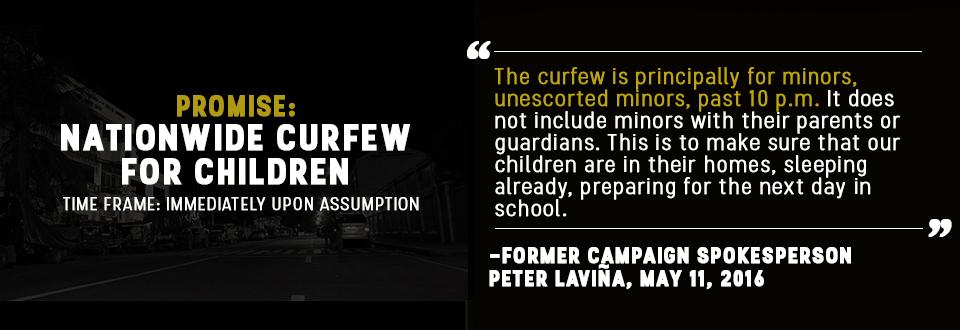
Three Metro Manila cities tried to implement a curfew from 10 p.m. to 5 a.m., but the Supreme Court issued a temporary restraining order in July 2016 on the city ordinances, while it deliberates on the constitutionality of the ordinances.
Duterte had expressed his hopes that the high court would lift the TRO and allow the implementation of the curfew, which would be similar to that in his hometown of Davao City.
Duterte said he plans to impose a curfew in several parts of Mindanao under martial law, which had been imposed on the entire island to quell the terrorists attacking Marawi Cty.
— Virgil Lopez, Marlly Rome C. Bondoc and Joseph Tristan Roxas/BM, GMA News




